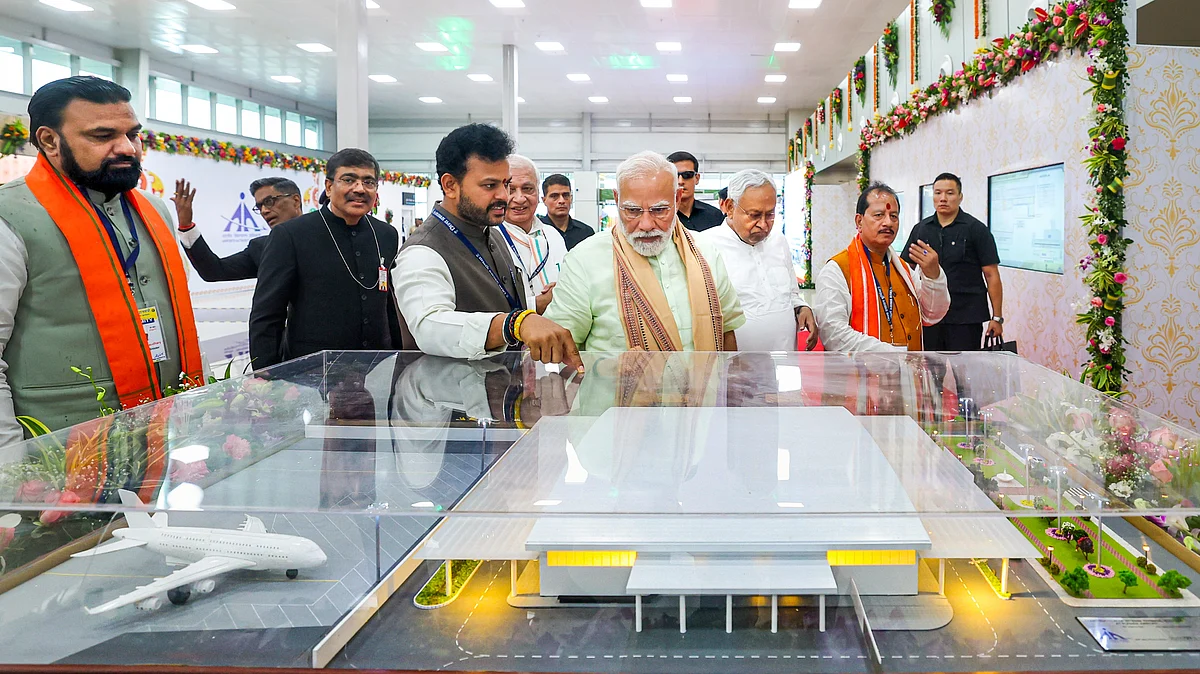Not going anywhere, will remain in NDA henceforth: Nitish in presence of PM
For those with long memories, the vows of permanence sound suspiciously like the promises of a serially wayward partner

At a rally in Purnea on Monday, Bihar chief minister Nitish Kumar declared his undying devotion to Prime Minister Narendra Modi and the NDA. “I could never be comfortable with those people,” he said of RJD and Congress. “They always indulged in mischief when we shared power... I am now back. And, I will not go anywhere henceforth.”
The applause, and Modi’s smile, suggested a happy reunion. But for those with long memories, the vows of permanence sound suspiciously like the kind of promises a serially wayward partner makes — more out of necessity than conviction.
After all, this is the same Nitish Kumar who once could barely hide his disdain for the BJP and its ideological mothership, the RSS. In 2022, he publicly asked of them: “How are they linked to Independence?… Where were you during the Independence struggle? Who fought the battle for Independence?” He even warned that the RSS would one day “discard Bapu”.
Earlier, in 2016, he urged socialists to unite against “a particular ideology”, a not-so-subtle jab at the BJP’s brand of politics. In other words, the man now pledging eternal loyalty to the NDA once accused it of historical fraudulence and ideological intolerance.
The irony is rich: a politician who positioned himself as the inheritor of Jayaprakash Narayan and Ram Manohar Lohia’s socialist mantle now seeks stability and respectability in the BJP’s company. The very party he framed as a usurper of the freedom struggle and an enemy of pluralism is now his chosen shelter. Nitish hasn’t so much resolved his contradictions as learned to live with them, loudly professing devotion whenever his credibility looks shaky.
The rhetoric has shifted from critique and distance, to embrace (or at least acceptance) of a partner he once painted in almost ideological colours of opposition.
During his alliances with RJD/Congress, Nitish has publicly alleged mismanagement in departments led by RJD ministers. He has said decisions were made without accountability, and that administrative discipline suffered. These accusations include misuse of funds, non-transparent decision making, and delayed or ignored implementation of schemes.
Nitish claims the government under RJD/Congress could not maintain security properly. He has often pointed to rising crime, communal flare-ups, and a general sense of insecurity among citizens. For him, the cost of sharing power was compromising on basic governance and not having full control over law enforcement.
Another part of “mischief” is that alliances with RJD/Congress were undermined from within. Nitish has suggested that his coalition partners were frequently more focused on vote-bank politics, inflating internal demands, and undermining governance for political gains rather than putting people first. In his own telling, these repeated frictions made it impossible to govern effectively, prompting him to abandon those partnerships.
These claims give him justification — at least in political messaging — to say he has learnt from these alliances, that his return to NDA is not just convenience, but a rescue from chaos (as he portrays it).
Here’s where the story gets complicated. Even as Nitish paints past alliances as lawless and anarchic, critics argue that the current NDA government has its own share of problems — especially in law and order. A few recent examples suggest Nitish’s version of “order” is under pressure.
Chirag Paswan (of the LJP, an NDA ally) has publicly lamented the law and order collapse. He said he was “sorry to support” a government that’s failing on this count, citing rising violent crimes, kidnappings, rapes. He accused the administration of being unable to keep crime in check and even charged it with “connivance with criminals.”
One especially chilling case: five armed men reportedly entered a Patna hospital and shot dead a criminal who was out on parole, all captured on CCTV. Such incidents provoke questions: if hospitals, supposedly safe zones, are breached with impunity, how robust is the security apparatus?
Critics, including Opposition parties, point to what they see as lax policing, delayed responses to crime, and a sense that criminal elements are emboldened. For instance, attacks and murders in broad daylight, recurring violent incidents, and rising fear among sections of the public.
Nitish’s vow of “never going anywhere henceforth” is politically powerful. But governance, especially law and order, is the kind of foundation that cracks when promises aren’t matched with perception. If people feel unsafe, those cracks widen into distrust. And in politics, perception often matters more than claims of loyalty.
With PTI inputs
Follow us on: Facebook, Twitter, Google News, Instagram
Join our official telegram channel (@nationalherald) and stay updated with the latest headlines